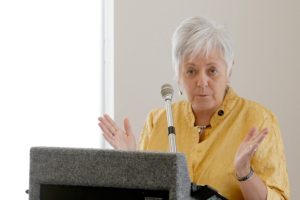Don’t forget to enjoy the dance.
That’s the advice my first newspaper editor offered nearly every time I left to do an interview.
A good-natured cynic with an internal scale for fairness, I’m convinced Rudy embodied most stereotypes surrounding newspaper guys. His clothes were rarely free of wrinkles, not that he noticed or cared. He could remember the name of the old city manager’s brother’s cousin’s side business, but couldn’t find his keys. The top of his desk was the inspiration for Jenga; his bottom left drawer the keeper of whiskey and Dixie cups.
And I was the green banana that soaked up his advice like sunlight.
Rudy had a theory on interviews. They were, he said, a lot like dancing, with each person hoping to show off their own steps on the floor. Interpreting a partner’s signals and improvisation were skills learned with practice and patience, so long as you always remembered to enjoy the dancing.
That is, in each interview, the journalist and her subject have goals in mind. The broad goal of the journalist is to get the information needed to build a story. The subject wants to impart specific information so the finished story is built in a pleasing way.
When both parties come prepared, ready to enjoy the dance, the give and take results in a comprehensive performance. Of course, information from the subject is provided to the journalist. But the subject can also glean knowledge from the journalist on how the community is thinking about or reacting to the topic of the interview.
To continue the metaphor, talented dancers know how to feel the music and guide the performance so their best moves are presented.

Above all else, this is why an earlier decision by University of Iowa President Sally Mason and/or her staff to end long-standing, one-on-one interviews with student journalists from The Daily Iowan was so incomprehensible. Mason isn’t new to the public eye and has likely completed hundreds if not thousands of interviews. She is, or at least should be, a very experienced dancer.
While a university spokesman has carefully sidestepped implications the DI sit-downs ended, at least in part, because of a poorly chosen statement by Mason regarding sexual assaults on campus, the timing of “scheduling conflicts” in relation to the controversy sparked by that statement speaks for itself. A misstep on behalf of a company’s most experienced dancer should not signal the end of the show or dismissing of the partner.
If Mason’s handlers hold so little confidence her ability to participate in interviews, it isn’t the student journalists that deserve immediate direction to exit stage right.
As part of university administration, Mason is obligated to ensure educational opportunities for students, and she is especially positioned to fulfill this duty for journalism scholars. Given her background and awards as an educator, it hardly seems an interview a month is overly taxing or stressful.
So, it’s good that Mason has spoken with DI Editor Jordyn Reiland and agreed to resume regularly scheduled sit-downs in January.
Here’s hoping all parties remember to enjoy the dance.
This column by Lynda Waddington originally published in The Gazette on Dec. 20, 2014. Photo credit: Adam Wesley/The Gazette
